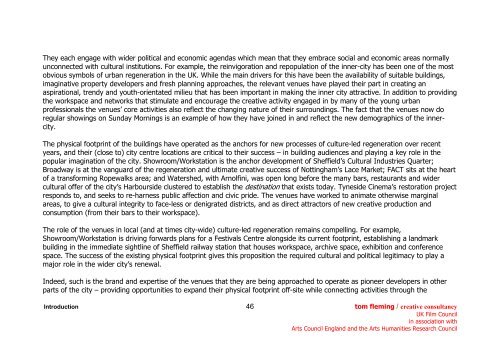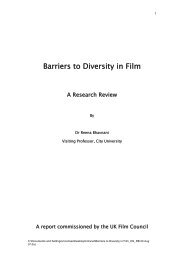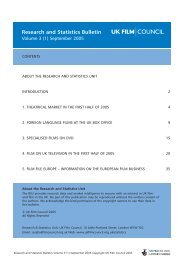Crossing Boundaries - BFI - British Film Institute
Crossing Boundaries - BFI - British Film Institute
Crossing Boundaries - BFI - British Film Institute
Create successful ePaper yourself
Turn your PDF publications into a flip-book with our unique Google optimized e-Paper software.
They each engage with wider political and economic agendas which mean that they embrace social and economic areas normally<br />
unconnected with cultural institutions. For example, the reinvigoration and repopulation of the inner-city has been one of the most<br />
obvious symbols of urban regeneration in the UK. While the main drivers for this have been the availability of suitable buildings,<br />
imaginative property developers and fresh planning approaches, the relevant venues have played their part in creating an<br />
aspirational, trendy and youth-orientated milieu that has been important in making the inner city attractive. In addition to providing<br />
the workspace and networks that stimulate and encourage the creative activity engaged in by many of the young urban<br />
professionals the venues’ core activities also reflect the changing nature of their surroundings. The fact that the venues now do<br />
regular showings on Sunday Mornings is an example of how they have joined in and reflect the new demographics of the innercity.<br />
The physical footprint of the buildings have operated as the anchors for new processes of culture-led regeneration over recent<br />
years, and their (close to) city centre locations are critical to their success – in building audiences and playing a key role in the<br />
popular imagination of the city. Showroom/Workstation is the anchor development of Sheffield’s Cultural Industries Quarter;<br />
Broadway is at the vanguard of the regeneration and ultimate creative success of Nottingham’s Lace Market; FACT sits at the heart<br />
of a transforming Ropewalks area; and Watershed, with Arnolfini, was open long before the many bars, restaurants and wider<br />
cultural offer of the city’s Harbourside clustered to establish the destination that exists today. Tyneside Cinema’s restoration project<br />
responds to, and seeks to re-harness public affection and civic pride. The venues have worked to animate otherwise marginal<br />
areas, to give a cultural integrity to face-less or denigrated districts, and as direct attractors of new creative production and<br />
consumption (from their bars to their workspace).<br />
The role of the venues in local (and at times city-wide) culture-led regeneration remains compelling. For example,<br />
Showroom/Workstation is driving forwards plans for a Festivals Centre alongside its current footprint, establishing a landmark<br />
building in the immediate sightline of Sheffield railway station that houses workspace, archive space, exhibition and conference<br />
space. The success of the existing physical footprint gives this proposition the required cultural and political legitimacy to play a<br />
major role in the wider city’s renewal.<br />
Indeed, such is the brand and expertise of the venues that they are being approached to operate as pioneer developers in other<br />
parts of the city – providing opportunities to expand their physical footprint off-site while connecting activities through the<br />
Introduction 46<br />
tom fleming / creative consultancy<br />
UK <strong>Film</strong> Council<br />
in association with<br />
Arts Council England and the Arts Humanities Research Council

















